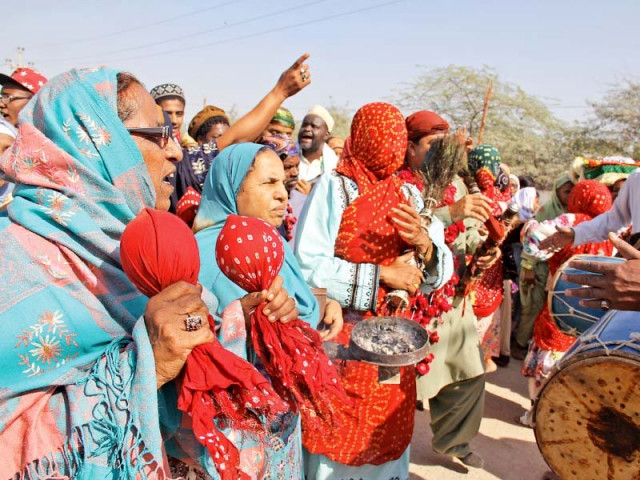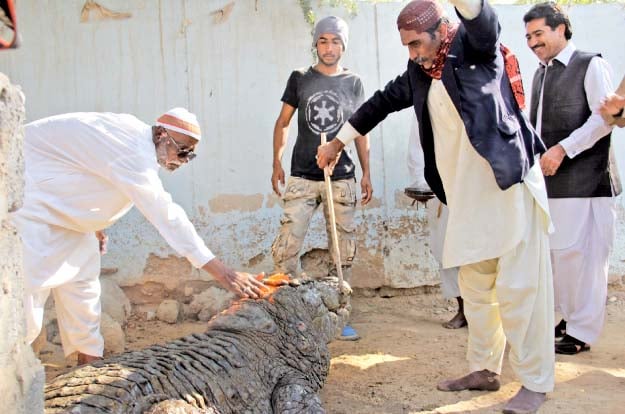Manghopir holds Sheedi mela after seven-year hiatus
Celebrations shortened to one day instead of four

The traditional dance during the Sheedi Mela was led by women, who wore red baskets on their heads and covered their faces with chunri dupattas. PHOTO: AYESHA MIR/EXPRESS
Men, women and children took to the streets in festivity, doing their traditional dhamal of taking two steps forward and one step back. They paid tribute to the saint of Manghopir, Hazrat Khawaja Hassan, and his devoted crocodiles who reside in a swamp inside the shrine.
The dance was led by women, who wore red baskets on their heads and covered their faces with chunri dupattas. The men held their historic blue flag as they moved alongside, their feet moving to the mystical beat of the drums.
The celebrations on Monday marked not only respect for the beloved saint, popularly known as Sakhi Sultan Manghopir, but also the freedom that the African descendants now have to practice their rituals. Militant groups held a tight grip over Manghopir area for the last seven years making it near impossible for this festival to be held. In fact, the Sheedi community travelled to Hyderabad in March 2015 to hold the festival.

As part of the Sheedi Mela, the community offers meat to the oldest and largest crocodile in the swamp, called Mor Sahab. They also pour red powder on its head and mark the end of the festival.
Until 2010, the Sheedi community held two festivals every year - one in the Islamic month of Zilhaj to mark the urs of the saint and the second one in the month of Rabius Sani for his devoted crocodiles.
Situated on a hill in District West, the shrine of Manghopir stands tall amid the dust of marble crushing factories. It is considered a cultural hub for the Sheedi community and their colourful cultural practices. The Sheedi community comes from the northern parts of Africa and traces its ethnicity to Hazrat Bilal (RA) - a companion of Holy Prophet (pbuh), shared Muhammad Hussain, a senior member of the community. Our ancestors arrived here as soldiers a few centuries ago, he added.
"These sounds of celebrations have echoed the town after seven years," said Hussain. "I can't express how happy and satisfied we are."
Hussain explained they called off the festival for the past seven years due to the sensitive law and order situation. "But only we can understand how we have stopped ourselves from celebrating the annual Urs of our master," he said.
The celebrations have, however, been shortened to one day instead of four. "If, by the grace of Allah, this goes peacefully, we will work on three-day Urs festivities in Zilhaj," he added.
The devotees carry meat, called 'Halwa', for the crocodiles.
The Halwa is first offered to Mor Sahab, the oldest and largest crocodile at the pond, said Iqbal Niazi, a devotee at the shrine who is not a member of the Sheedi community. The community elders pour red powder on the crocodile's head and then offer it meat, he explained, adding that this marks the end of the festival.
"All the wealth we have today is a blessing of Mor Sahab," said Husna, a community member. "Unfortunately, the people in our community are poor so we cannot feed the crocodiles enough meat. But it is a miracle of Manghopir that they are healthy and active."
Myth or not?
According to Ghulam Ali, who is a member of the family that takes care of the shrine since its inception, the story of this saint goes back centuries. "We learned from our elders that Sultan Baba or Manghopir was a Hindu but, when he met Hazrat Baba Fariduddin Masood Ganj Shakr, the saint converted to Islam.
There are different myths surrounding the crocodiles but the elders believed that they were the lice of Baba Farid, who were turned into crocodile as a miracle and gift to Sultan Manghopir.
Published in The Express Tribune, January 24th, 2017.


















COMMENTS
Comments are moderated and generally will be posted if they are on-topic and not abusive.
For more information, please see our Comments FAQ